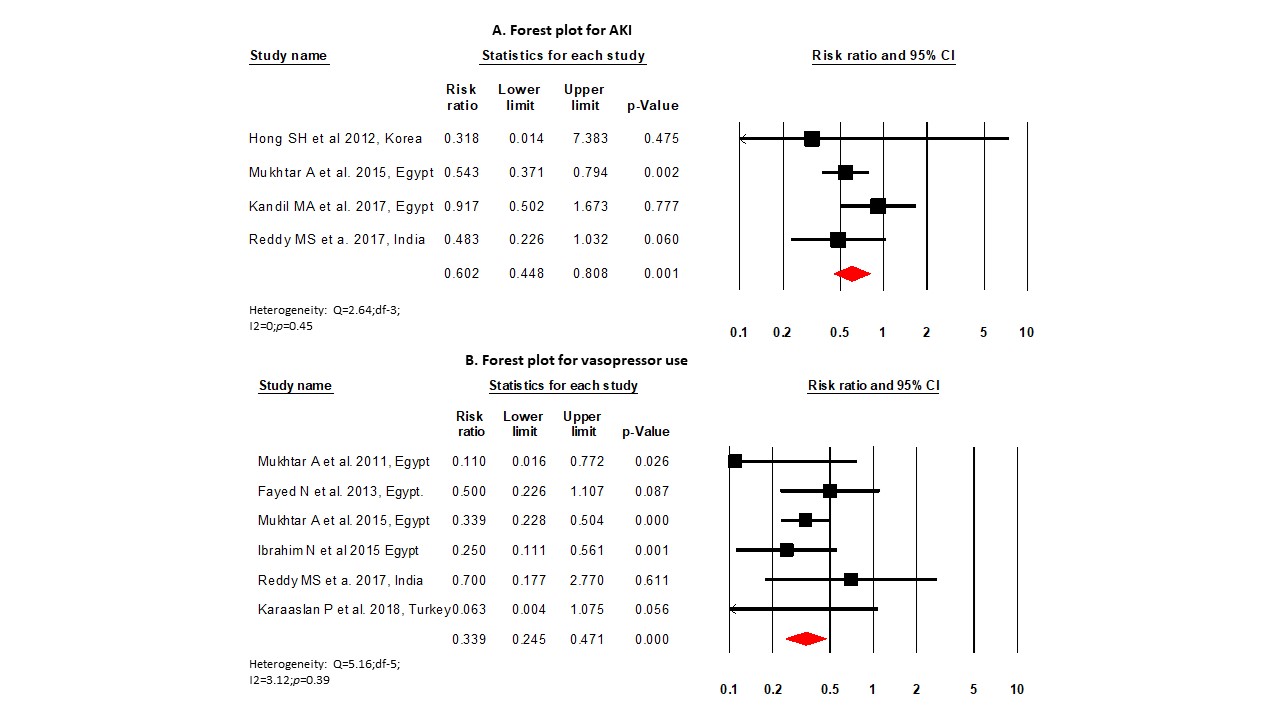Perioperative Terlipressin Therapy Reduces the Risk of Acute Kidney Injury Post-Living Donor Liver Transplantation – A Systematic Review and Meta-analysis
A. V. Kulkarni, H. V. Tevethia, M. Sharma, P. Kumar, N. P. Rao, N. D. Reddy
Hepatology and Liver Transplantation, Asian Institute of Gastroenterology, Hyderabad, India
Meeting: 2021 American Transplant Congress
Abstract number: 1083
Keywords: Liver transplantation, Living donor, Meta-analysis, Renal injury
Topic: Clinical Science » Liver » Liver: Kidney Issues in Liver Transplantation
Session Information
Session Name: Liver: Kidney Issues in Liver Transplantation
Session Type: Poster Abstract
Session Date & Time: None. Available on demand.
Location: Virtual
*Purpose: Acute kidney injury (AKI) after liver transplantation precludes calcineurin inhibitors’ therapy and is associated with poor outcomes. Terlipressin (Tp) has mortality benefit in pre-transplant patients with AKI; however, the data on perioperative use of Tp and its effect on post-transplant outcomes has not been systematically reviewed.
*Methods: A comprehensive search of electronic databases from 2000/01/01 to 2020/10/31 was performed. Studies reporting the use of Tp in the perioperative period were included. We considered the random model risk ratio (RR) as the primary result unless I2<50%. The primary aim was to assess the risk of AKI post-transplant. The secondary was to assess the need for renal replacement therapy (RRT), vasopressors, blood loss during surgery, hospital stay, and in-hospital mortality.
*Results: A total of nine studies reporting 711 patients undergoing LDLT were included for analysis. Males-83%. Tp was given for a mean duration of 53.44±28.61 hours post-surgery. Tp reduced the risk of post-transplant AKI by 60% (RR-0.6; 95%CI-0.44-0.8; p=0.001) among 166 patients who received Tp compared to 269 control (C) patients among four studies (I2=0; p=0.45) (Fig. A). Need of RRT was similar in Tp (n=135) and C (n=238) group (RR-0.75 (0.35-1.56); p=0.44) among 3 studies (I2=0; p=0.75). Tp therapy reduced the risk of vasopressor use by 33% (0.24-0.47; p<0.001) among six studies (I2=3.12; p=0.39), which reported 240 patients in the Tp group and 342 in the control group. (Fig. B) Blood loss was similar in both groups (-302.12 ±215.32; p=0.16) among four studies (I2=43.16; p=0.15) which reported. There was no mortality benefit with Tp [RR-1.08 (0.48-2.42);p=0.84)] among two articles, which reported in-hospital mortality among 147 and 242 patients in T and C groups, respectively. Mean hospital stay was also similar in both groups [-0.94 (-2.24 to 0.35) ;p=0.15] among 4 studies (I2=52.5; p=0.09) which reported hospital stay among 424 patients. Mean ICU stay was also similar in both the groups [0.08 (0.42 to 0.18) ;p=0.84] among 4 studies (I2=82.83; p<0.001) which reported 465 patients. Only one study reported adverse events (bradycardia) to Tp.
*Conclusions: Perioperative Tp therapy reduces the risk of post-transplant AKI and the need for vasopressor treatment. However, its use is not associated with a reduction in hospital stay, need for RRT, or mortality. Future extensive, randomized studies are required to assess the beneficial role of Tp on post-transplant outcomes.
To cite this abstract in AMA style:
Kulkarni AV, Tevethia HV, Sharma M, Kumar P, Rao NP, Reddy ND. Perioperative Terlipressin Therapy Reduces the Risk of Acute Kidney Injury Post-Living Donor Liver Transplantation – A Systematic Review and Meta-analysis [abstract]. Am J Transplant. 2021; 21 (suppl 3). https://atcmeetingabstracts.com/abstract/perioperative-terlipressin-therapy-reduces-the-risk-of-acute-kidney-injury-post-living-donor-liver-transplantation-a-systematic-review-and-meta-analysis/. Accessed February 14, 2026.« Back to 2021 American Transplant Congress

